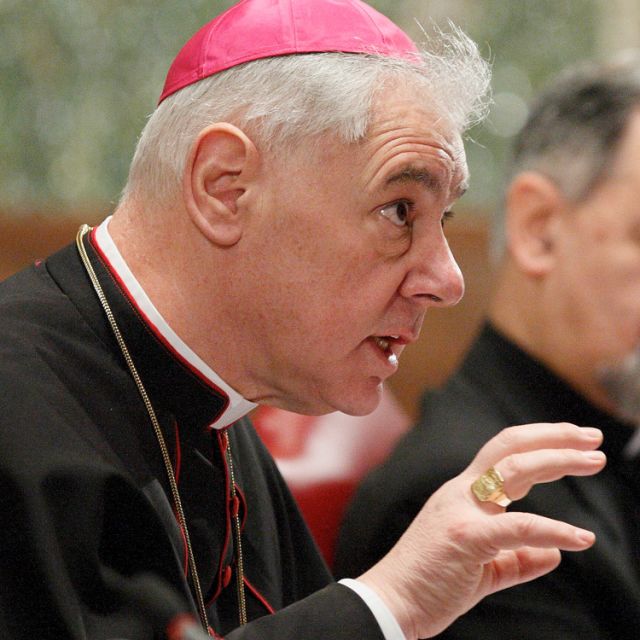The appointment automatically elevates the former bishop of Regensburg, Germany, to the rank of archbishop, according to a Vatican statement July 2.
The archbishop’s academic research focuses on “ecumenism, modern age theology, the Christian understanding of revelation, theological hermeneutics and ecclesiology — the priesthood and the diaconate,” according to the web site of the Diocese of Regensburg.
He has authored more than 400 works with the most well-known being the 900-page “Catholic Dogmatics: For the Study and Practice of Theology.”
In 2004, he co-authored a book titled “On the Side of the Poor: The Theology of Liberation” with Dominican Father Gustavo Gutierrez, who is considered the father of liberation theology.
Though the doctrinal congregation, led by then Cardinal Joseph Ratzinger, asked Father Gutierrez, to write and rewrite articles clarifying some of his theological and pastoral points during the 1990s, the doctrinal congregation expressed approval in 2004 of his latest work on ecclesial communion, which was published by a pontifical university.
Archbishop Muller has been a member of the doctrinal congregation since 2007 and was a member of the International Theological Commission from 1998 to 2003 — both bodies that Pope Benedict led until 2005 when he was elected pontiff.
The archbishop is also a member of Pontifical Councils for Culture and for Social Communications. He was named in June as a member of the Congregation for Catholic Education and the Pontifical Council for Promoting Christian Unity.
He is also a member of the doctrinal congregation’s “Committee for the Preparation of the Year of Faith,” which helped draw up a note of pastoral recommendations for the year, which begins in October.
He has close ties to Pope Benedict and in 2008 helped establish the Pope Benedict XVI Institute, which is publishing a complete collection of works by Joseph Ratzinger/Pope Benedict XVI. Pope Benedict personally commissioned the archbishop to lead the publication of his collected works, according to the Diocese of Regensburg.
He is also a contributing academician of the Pontifical Academy of St. Thomas Aquinas.
In his new capacity at the doctrinal office, the archbishop will follow the Vatican-mandated reform of the U.S. Leadership Conference of Women Religious. He will also oversee talks with traditionalist Catholics and the handling of accusations of sexual abuse of minors by priests — two issues he has dealt with extensively as bishop of Regensburg.
The traditionalist Society of St. Pius X has a seminary in Zaitzkofen in the Diocese of Regensburg, and the archbishop has criticized the society’s illicit ordinations of priests and deacons there as “a sin against church unity.” He has said the unauthorized ordinations violate canon law and create a “dangerous situation” for the church.
There have been incidents of abuse involving the diocese, including the cathedral’s famous boys’ choir and school. Two priests accused of abuse in the 1950s have been jailed and the archbishop has said any claims of sexual abuse would be treated with “the maximum transparency.”
However, he faced criticism for his reinstatement in 2004 of a priest previously convicted of child molestation. The priest, whose therapist had declared him no longer dangerous, was arrested in 2007 on further abuse charges.
Upon news of the arrest, Muller expressed his “deepest regret and sympathy towards those children who have been mentally scarred” and promised “every imaginable assistance.”
During a 2010 conference in Rome marking the Year for Priests, he told reporters it was “stupidity” to believe that celibacy causes clerical sexual abuse, and he said that any priest who sexually abuses a child has placed himself outside of the priesthood, even before the church acts formally to dismiss him.
Concerning the church’s teaching against women’s ordination, he explained in a speech in 2002 that the Catholic Church does not profess that “men are superior to women,” but emphasized that Christ chose only men as his Apostles.
On the level of symbolism, with Christ as the bridegroom of the church, the maleness of the priest is essential, he said. “Being priests, just like being a father or a mother, is not a social profession, position or role. Being a priest implies a personal relationship and the representation of a person through another,” he said.
Born in Mainz, Germany, Dec. 31, 1947, the archbishop became a priest in 1978 and served in his native diocese as a chaplain and high school religion teacher.
With degrees in philosophy and theology, he was a professor of dogmatic theology in Munich from 1986 to 2002.
He was named Bishop of Regensburg in 2002 and then-Cardinal Ratzinger attended his episcopal ordination. Then Bishop Muller chose as the motto for his episcopate “Dominus Iesus” (Jesus is Lord), which comes from St. Paul’s Letter to the Romans and is the title of the 2000 document on salvation through Christ alone, issued by then Cardinal Ratzinger’s doctrinal congregation.
Pope names German theologian to head doctrine office
By Carol Glatz, Catholic News ServiceVATICAN CITY — Pope Benedict XVI has named Archbishop Gerhard L. Muller of Regensburg, Germany, the new prefect of the Congregation for the Doctrine of the Faith.
The 64-year-old expert in dogmatic theology and ecumenism, who has co-authored a work on liberation theology, replaced U.S. Cardinal William J. Levada, who retired at 76.
As head of the doctrinal congregation, the archbishop also assumes the roles of president of the Pontifical Commission Ecclesia Dei, the Pontifical Biblical Commission and the International Theological Commission.
Please support The Catholic Register
Unlike many media companies, The Catholic Register has never charged readers for access to the news and information on our website. We want to keep our award-winning journalism as widely available as possible. But we need your help.
For more than 125 years, The Register has been a trusted source of faith-based journalism. By making even a small donation you help ensure our future as an important voice in the Catholic Church. If you support the mission of Catholic journalism, please donate today. Thank you.
DONATE

